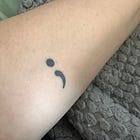FINDINGS: How Writing Saved My Life, guest post by Nicole Force
Weirdness from the Research Rabbit Hole
Today I have a guest post for you from Nicole Force, Magical Western. In this piece, Nicole reflects on their journey of using writing as a powerful tool for healing and self-discovery, sharing how it has helped them navigate trauma, depression, and anxiety, and offering practical writing practices that others can leverage for wellness.
I am a survivor. Of trauma, the death of a parent, emergency surgery, and life-long depression and anxiety. Writing stayed with me the entire time.
Although my first story was fun—a mystery mansion published on construction paper around age 5—as a troubled teen I poured my soul into poetry. Being “different” and having a predisposition to depression and anxiety whammied me. But the double wammy was my father’s sudden death, which disintegrated the life I knew.
We tend to think of “surviving” as “succeeding,” but survival often requires leaving behind important things. Sometimes things we still need! The purse, and the ID in it, gets left in the burning house.
I drove myself to college—literally and figuratively—choosing an English degree and a Fine Arts degree to bury my pain and relieve distress. At the time, the emotions and cycles I experienced, in addition to grief, were disconcerting. I could barely keep my feet under me. Writing and art became a way to express and expel the feelings. You see, creating keeps you in the present moment through a trick of the brain. It’s very hard to multitask ruminating while you are moving and doing. And, I believed that recording my feelings, the related words, and images for safe-keeping would allow me to revisit, mull over, and pick through them anytime I chose. I did not have to hold these difficult thoughts in my brain. Soon, I realized I no longer needed to revisit them at all.
Creative non-fiction in college also gave me new tools for writing. At that time, my essays were treatises on my brand of feminism (A Deer Walks into a Bar, My Roommate Is a Pushy Lesbian, and Cinderella—the Villain), but I learned short story format, too. I enjoyed exploring others’ fictional issues and themes, but creative non-fiction held the keys to developing a better understanding of my life. Combining reality with metaphor shaped meaning for me, analyzing my situation through essay format simplified my confusion, and progressing multiple drafts helped me tame my mind.
It was a serious relationship with my future husband, and my counselor and doctor, that clarified for me that I suffered from cyclical depression. My depression affected my most important relationships to the point that I had to make a decision: Continue suffering depression along with all the confusion it wrought or treat it. Although I dreamed of a writer’s life, I embarked on making a living in an office, starting a family and a career in technical writing, and using my medical benefits. (My future self thanks my past self for this. Thank you! We accomplished a lot there, didn’t we?)
But after my second experience giving birth, in which I had a life-threatening condition (described by my medical professional as “basically you’re a walking timebomb, get off your feet and into bedrest), followed by my youngest son’s failure to thrive and GI issues, the old black dog of depression and trauma raised its snarling head.
I rushed to counseling and EMDR therapy, but I also started writing again as a daily practice. And I began noveling.
This time, between breastfeeding, parenting my oldest son, and supporting my husband in furthering his career, I told emotional truths in fictional format.
Then I realized: Writing is not just a way to understand my mind, it’s a way to change my mind. It’s a superpower.

How Did Writing Help Me Process?
I began by outlining a plot around my main character’s growth arc. How nice it was to be in control of fate and the lessons learned (even if they were not my own)! I incorporated a gift of insight I’d received—a piece of weathered glass that I found on the ground right after asking God for a sign. Or any sign, really, I said. I didn’t believe the glass was anything but trash at first. I picked it up at the bottom of a confusing abyss filled with intrusive traumatic thoughts and no longer knowing how to move forward in peace. Yet the glass became the symbol of my story, and I had a purpose then to share my finding with other sufferers.
It also felt empowering to write about a character who was not myself. I could control her situation, her realizations, and her growth. I could give her the outcomes I would have wanted. But a more valuable, healing discovery? Writing about characters surrounding her gave me new insight into peoples’ relationships. Each character must have motivation, purpose, and reactions. And humanity! I had to find truth and compassion for all my characters to make them feel real.
Fiction writing became calisthenics for my heart-mind connection.
Learning to tell a story from different perspectives—seeing events through multiple interpretations—eventually provided me a more positive outlook in life and uncovered hidden resources.
An amazing thing happened to me: Working with story led to better self-acceptance and compassion.
What Did I Do with the Novel I Wrote?
This novel was queried, and it drew some attention, but it needs more rewriting and ultimately I set it aside. Perhaps it is still too personal or it’s just not ready to go out into the world. That’s OK—I got a lot out of the project.
It’s fun again to explore challenges, themes, and growth through fiction. And crafting supports my mental health. I write fiction installments on Substack to prompt weekly writing. Maybe I don’t always meet the challenge, but that’s not really the point.
Last year, I started a Substack story, Roseberry Tea, to respond to a challenge to write a cozy murder mystery, but I’m also developing the main character through meditation and a romantic interest that catalyzes her self-confidence and life choices. Her story shares ways of overcoming an awful upbringing, and her aunt provides a secondary perspective to enhance the story by telling about the generations in their family.
Currently, I have a second novel in progress. The main character grows into self-sufficiency and security. I am on the second draft of this novel now, and it has been selected for a manuscript bootcamp by Writing by Writers. I can’t wait for this new adventure!
Writing Practices that You Can Leverage for Wellness
Set a daily or weekly challenge for rewards in insight or production.
Start small—15 minutes a day or 1 hour a week—on a set schedule. If you write off-schedule that’s fine, but be sure to meet your scheduled time, too. Scheduling adds structure to days and weeks. This is especially helpful during times that we might feel like we’re floating along, as I did for a while after having a baby and medical issues.
Scheduling develops focus and a sense of familiarity in navigating your days, which can be rather comforting. Bonus: Join a writers’ group to talk about and support each others’ writing.
Join a writers’ read & critique group.
Writers make up an amazing community of creatives, memoirists, and family historians. Natural writers find treasures and they share them. I’ve never felt more heard or witnessed than I do in a good community.
If you happen to find a great group or a workshop with regular attendants—join it! If you want to start a new group:
Invite 2-4 other writers to attend on a certain day, time, and place.
Develop an agreement with everyone’s input and consent about how to share the writing, comment on it, and respect each other and their confidentiality. Make this easy to follow.
Everyone should share, and everyone should comment. Trust, and writing skills, are developed through the exchange of vulnerability and support.
Maintain the group by adding new members and occasionally revisiting the group’s agreement.
Use a mentor, writing coach, or writing buddy to schedule a regular write-in.
Attend regular writing sessions at a coffee shop or a cozy location. Check-in with each other, sit and write for extra company, and read each other’s work. It’s kind of like therapy, but more fun!

Write about your writing.
What are you writing about, and what are your goals (even if it’s to have no goal)? What value do you see, or want to develop, in your writing? What are your next steps?
For individual works, what are the stakes for each character or person in your story? What are their motivations, reasoning, and backstory that cause them to respond to others and make choices as they do? How do they perceive events? What are plausible, surprising, or poetic outcomes of each character’s actions in the story? Is there any humor to be found in this story?
My favorite: If the main character could make some serious magic happen in their life, what would that be? Last, discover the treasure in your story and how you will share it.
Journal creatively.
Make your journal uniquely yours and interesting to you.
Write notes, free-write, track, or illustrate your days, thoughts, and stories that come up over a period of time. You will begin to see, even change, trends in your thinking.
Find some magic in creative thinking and bring in resources like dreams, patterns, and found objects—interesting or sweet things, or little treasures you observed during your day.
Write your intention before starting your day (before looking at your phone or anything else), and then write three things at the end of the day that happened that you are grateful for (right before you go to sleep). The results from gratitude writing and raising your subconscious thinking can be powerful.
A new journaling activity I just learned is flipping a narrative about lack to an affirmation of empowerment. Some examples:
“Once I am a better teacher, I will feel good about all my classroom outcomes.” Flip to: “I am learning with every opportunity in the classroom and that makes me a strong teacher, maybe one day one of the best.”
“It sucks not having electricity due to a planned power outage; I’m hot, bored, and anxious about climate change.” Flip to: “If I choose sitting outdoors, followed by a cold shower and candles in my house, I will be calmer and more capable at meeting any challenges.”
“My work-in-progress novel must be an overnight success for me to be a successful author.” Flip to: “I am already a self-published author, and producing the novel to the best of my ability (regardless of how it is published) will be a huge accomplishment.”
Now You!
Give writing a try. I’d be delighted for you to join the writing community, follow my writing progress, or read my Substack! See you out there.
Huge thanks to Nicole Force, Magical Western for this guest post.








"Writing is not just a way to understand my mind, it’s a way to change my mind." I found this very inspiring!
I took away empowerment from this. Excellent tips too! Thank you